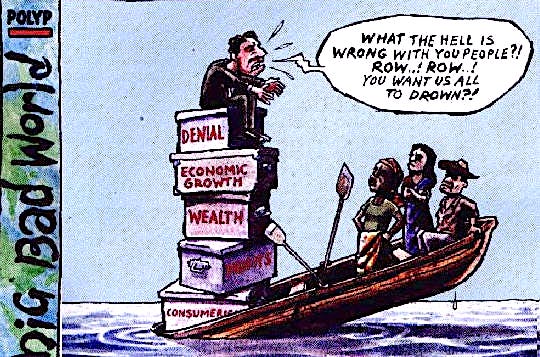Sometimes, I sit in deep thought—troubled, almost burdened—by an unsettling fear of what lies ahead for us as a people. I find myself asking questions that many either avoid or pretend not to hear. How did we steer the ship of our nation to this dangerous point, yet still delude ourselves that we are on course?
It feels like we are all aboard a vessel drifting aimlessly in a stormy sea. The captain is just as confused as the sailors and crew. Yet, no one dares to speak up—not for fear of sinking, but for fear of falling out of favor. No one wants to tell the captain that the compass is faulty, or worse, obsolete. Instead, we all remain quiet, allowing the ship to drift farther—perhaps beyond the horizon of redemption.
I often look at the younger generation and, strangely, I feel more pity for them than I do for myself or those who came before us. I used to think that my generation had witnessed the worst of moral decay—but when I observe Generation Z, I cannot help but conclude that even the worst of Generation X would seem like saints by comparison.
But can we truly heap all the blame on them? These young people are merely mirrors, reflecting the errors of the generations that preceded them. It’s ironic—those who often reminisce about the “good old days” are the same ones who allowed those days to wither away, through their negligence and inaction. They failed to preserve the values they now hold up as a standard.
We, as a nation, have mastered the art of pretending that all is well, while ignoring the festering issues beneath the surface. We keep postponing urgent solutions, clinging to a foolish belief that “time will tell.” Sadly, time only reveals more decay. Time, in itself, is abundant—but attention is scarce. And therein lies the heart of our crisis.
We are reckless with time because we believe we have plenty of it. But we ignore the far more powerful tool—attention. Sometimes, five minutes of focused attention can save us from decades of disaster.
Where we’ve gotten it wrong is in trading attention for the illusion of time.
If we had paid more attention to the behavioral patterns of our children, perhaps we would have noticed when their upbringing began to deviate from our moral and cultural values.
If we had been more attentive, we would have spotted the difference between an ethnic bigot masquerading as a patriot and a true national leader.
If we had looked beyond the glitter of riches and asked harder questions about the source of wealth, perhaps we would have raised a generation that prizes integrity over materialism.
If we had paid attention to the character, competence, and capacity of those seeking to rule us, we might have chosen leaders whose legacies go beyond their bank accounts.
If we had invested attention in grooming our children with values—rather than idolizing material possessions—we wouldn’t have raised a generation obsessed with “making it” at any cost.
If we had focused on the roots of our problems, we might have become more proactive instead of reactive—meeting crises with solutions instead of excuses.
If we had paid attention to sincerity, honesty, integrity, fairness, justice, and transparency, perhaps our society would have rejected corruption and its many offspring.
But we’ve ignored the foundations, instead papering over cracks. We treat symptoms while the root cause rots beneath us. And because of this, every solution we attempt only creates new problems—sometimes worse than the original ones.
In moments like these, it almost feels like even the gods are perplexed.
How can the gods help a people who pretend that all is well while their very foundation burns beneath them?
How can the gods save a people who sing praises to their oppressors instead of crying out for deliverance?
It’s not that the gods are powerless. No. The gods are baffled—not because mortals have grown wiser—but because we constantly oppose every solution that could free us from this quagmire. We trade permanent peace for temporary pleasures—pleasures that serve only a privileged few while the majority suffer.
The gods, it seems, are helpless in our case—not by their own doing, but because we resist every effort to change course. We are a people who complain about our problems but fiercely criticize any real solution.
Indeed, the gods are perplexed—because they cannot save those unwilling to save themselves.
Perhaps the gods can help when we are indeed ready.



































